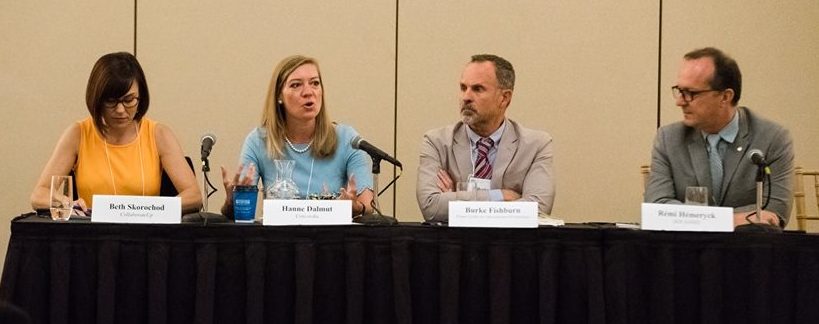Burke Fishburn, Executive Director for the Posner Center, participated on a panel of experts at the Society for International Development-Washington chapter, on May 30th, to discuss partnerships and what working together means in the world of international development. Burke was joined by Hanne Dalmut, Director of Partnership Development at Concordia in New York, and Remi Hemeryck, Executive Director of SOS Sahel, an NGO that works throughout 11 countries in the Sahel region of West Africa.
This panel focused on addressing the minimum requirements for a successful collaboration between two partnering organizations, as well as the challenges of creating meaningful partnerships that truly “hand over the development mantle” to local actors.
Participants had a fruitful discussion on the minimum enabling conditions for establishing partnerships. Ms. Dalmut emphasized that organizations should be motivated to invest internally in a workplace culture that fosters creativity and an entrepreneurial attitude. On the flip side, external success should be measured when partnerships create an actual marketplace of opportunity for local actors or intended beneficiaries.
Burke Fishburn simplified matters by stating that partnerships are all about starting from a shared goal. He emphasized the process as a major driver for success. He stated that each partner needs to recognize in their counterpart some type of trust and credibility, and that ultimately, fostering personal relationships and devoting time for the actual process of collaboration is what will generate results in the future.
From here, the conversation shifted directly into impact, issues of long term sustainability, and ensuring that partnerships and collaboration are intended for actual beneficiaries and not just for the sake of the partnership itself.
All of the panel members expressed sincerely that there is no easy way to quantify the success of partnerships, but Mr. Hemeryck assured the audience that one way in particular is to measure the revenues gained at various levels of the supply chain in development projects— such as smallhold farmers at the bottom of the pyramid.
Dealing with various rural development projects in the Sahel region, Mr. Hemeryck expressed a call to action for audience and panel members alike to ensure that local ownership is a part of the design process. As the director of a small NGO competing with other giants in the industry, he stated that local ownership of projects implemented from the top is a great way for small NGOs to gain reputation in the field. Ms. Dalmut added that it should be written into funding agreements that somebody or some partner involved in the collaboration has to have a local partner.
This breakout session was part of the larger 2019 Annual Conference hosted by the Society for International Development in Washington, D.C. on May 30th. For conference photos and videos, see here.
